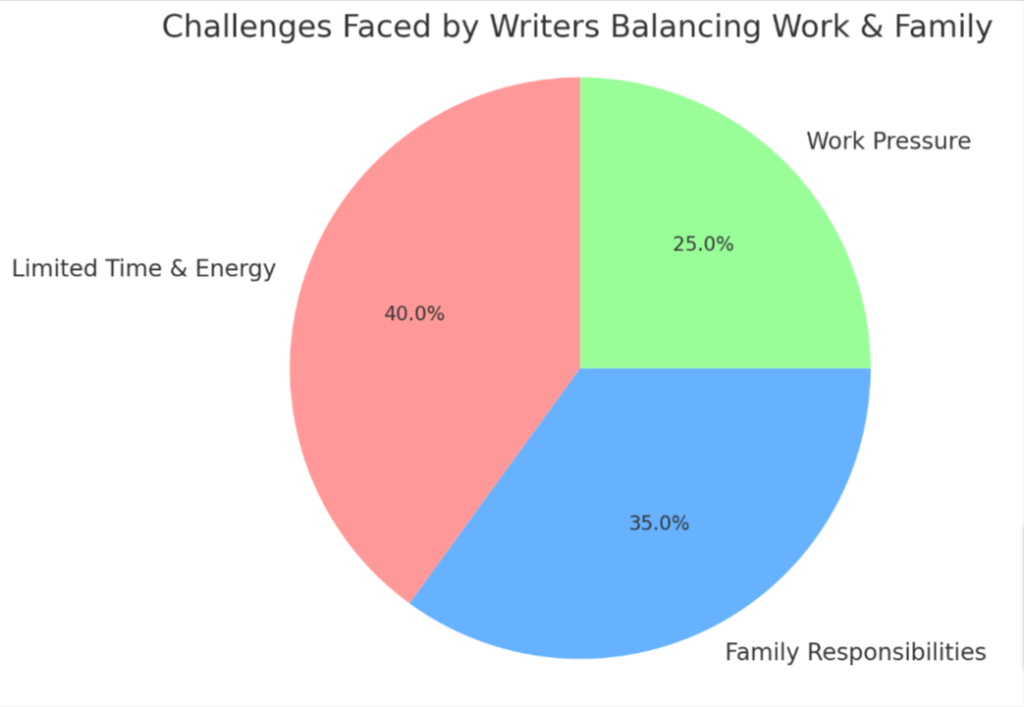Balancing the Pen and Parenthood: Strategies for Writers
Struggling to find a balance between writing, work, and family is a common dilemma many authors face. In fact, as per recent studies, few writers struggle more with achieving this equilibrium than those who are also parents or caregivers.
This guide provides practical strategies and tips on how successfully juggle your writing career, fulltime job and personal life without burnout. Ready to rediscover peace in the midst of chaos?.
Key Takeaways
- Balancing writing, work, and family requires setting realistic goals and prioritizing tasks.
- Treating writing like a job helps writers stay focused and productive.
- Communication with family and friends is important for support and understanding.
- Taking care of oneself is essential for maintaining work – life balance.
- Accepting limitations and being flexible with the writing schedule are key to finding balance as a writer-parent.
- Involving children in the writing process can create a supportive environment while fostering their creativity.
- Seeking support from other writers and parents provides valuable insights and encouragement.
Understanding the Challenges of Balancing Writing, Work, and Family
Balancing writing, work, and family can be challenging due to limited time and energy, the need to prioritize tasks and schedules, and feeling torn between responsibilities.
Limited time and energy
Dealing with limited time and energy often proves challenging for many writers juggling jobs and family. You may find yourself exhausted after a long day at work, struggling to muster the enthusiasm or mental clarity necessary for writing.
Perhaps your job consumes most of your waking hours, leaving little time to write or be with family. Fatigue can creep in, affecting overall output and productivity – not just in writing but also at work and home.
This makes finding an effective balance even more critical for maintaining both professional success and personal well-being.
Balancing priorities
Striking a healthy equilibrium between work, writing and family often involves the art of balancing priorities. This means understanding where to allocate time and energy optimally.
For writers who are managing careers and families, mastering this technique may seem daunting but it is absolutely doable.
Start by categorizing tasks based on urgency and importance. Learn to distinguish what requires immediate attention from what can be rescheduled or delegated. Prioritization helps in achieving work-life harmony while also pursuing career aspirations as an author without compromising on personal life quality time with family.

Feeling torn between responsibilities
Balancing responsibilities can often feel like a tug of war. As a writer, you might find yourself wrestling with personal duties and work obligations simultaneously. The stress from this conflict takes a toll on your energy levels and productivity.
At home, family members rely on your support and engagement while professional demands require full attention too. Striving to fulfill these dual roles may leave you feeling stretched thin at times, much like being torn between two worlds.
By recognizing this emotional burden, you’re taking the first step towards achieving true work-life harmony.
Strategies for Finding Balance
Set realistic goals, prioritize tasks and schedules, treat writing like a job, seek communication and support from family and friends, and make sure to take care of yourself.
Setting realistic goals
Setting realistic goals is a crucial aspect of achieving work-life balance as a writer juggling jobs and family responsibilities. By setting achievable targets for your writing projects, you can ensure that you make consistent progress without overwhelming yourself.
It’s important to consider your available time, energy levels, and other commitments when determining what goals are attainable within a given timeframe. This approach allows you to stay motivated and avoid feeling overwhelmed by unrealistic expectations.
So remember to set realistic goals that align with your current circumstances and prioritize the most important tasks to maintain balance in your life as a writer-parent.
Prioritizing tasks and schedules
To achieve work-life balance, it is important for writers to prioritize tasks and schedules. Here are some strategies to help you find the right balance:
- Make a to-do list: Write down all the tasks you need to accomplish, both for your writing and personal life. Prioritize them based on urgency and importance.
- Set realistic deadlines: Break down bigger projects into smaller, manageable tasks with specific deadlines. This will help you stay organized and focused.
- Allocate time slots: Block out dedicated time in your schedule for writing and family activities. Treat these time slots as non-negotiable commitments.
- Learn to say no: Don’t be afraid to decline additional responsibilities or obligations that could eat into your valuable time. Focus on what truly matters to you.
- Delegate tasks: If possible, delegate certain tasks at work or home to others who can assist you. This will help lighten your workload and free up more time for writing.
- Use technology wisely: Leverage tools like calendar apps, task management apps, and timers to stay on track and manage your time effectively.
Treating writing like a job
Treating writing like a job is essential for achieving work-life balance as a writer. Just like any other profession, dedicating specific time and effort to your writing can help you stay focused and productive.
Set aside dedicated hours each day or week for your writing projects, and treat that time as if it were an official appointment or work commitment. Minimize distractions, create a designated workspace, and establish clear goals for each writing session.
By treating writing as a job, you’ll be able to prioritize your creative endeavors while still managing your other responsibilities effectively.
Communication and support from family and friends
Family and friends play a crucial role in finding balance between writing, work, and family. It is important to communicate with them about your commitments and goals as a writer, so they can provide the necessary support and understanding.

Whether it’s giving you uninterrupted time to write, helping with household chores or childcare, or simply offering words of encouragement, their support can go a long way in helping you navigate the challenges of juggling multiple responsibilities.
By staying connected with your loved ones and keeping open lines of communication, you can create an environment that fosters both your writing career and personal relationships.
Taking care of yourself
Maintaining a healthy work-life balance as a writer can be challenging, especially when juggling jobs and family responsibilities. In order to find that crucial equilibrium, it’s important to prioritize self-care.
Make sure to schedule regular breaks and rest periods throughout your day, allowing yourself time to recharge both mentally and physically. Engaging in activities that bring you joy and relaxation, such as exercise or hobbies, can also help reduce stress levels and increase overall well-being.
Remember, taking care of yourself is not selfish—it’s essential for your productivity and happiness in all areas of life.
Tips for Juggling Writing and Parenting
Accept that you can’t do it all, so be flexible with your writing schedule and involve your children in your writing process to create a supportive environment. Seek support from other writers and parents to share tips and experiences while finding time for both writing and quality time with your family.
Accepting that you can’t do it all
Trying to juggle writing, work, and family can be overwhelming. It’s important to accept that you can’t do it all. Instead of trying to be superhuman, focus on what truly matters and prioritize accordingly.
Let go of the guilt and unrealistic expectations. By acknowledging your limitations and understanding that it’s okay to ask for help or delegate certain tasks, you’ll be able to find a better balance in your life as a writer and parent.
Being flexible with your writing schedule
Being flexible with your writing schedule is essential for finding a balance between work, family, and your writing ambitions. Here are some tips to help you achieve flexibility in your routine:
- Adapt your writing schedule based on your other commitments and responsibilities.
- Identify pockets of time throughout the day where you can squeeze in some writing, such as during lunch breaks or while waiting for appointments.
- Be open to adjusting your writing goals if unexpected events or obligations arise.
- Utilize technology to write on the go, such as using voice-to-text apps while commuting or running errands.
- Communicate with your family and let them know when you need uninterrupted writing time so they can support you.
Involving children in your writing
Involve your children in your writing to not only make them feel included, but also utilize their creativity and imagination. Collaborate on storytelling or ask for their ideas when you’re stuck.
Let them contribute by drawing illustrations or making up characters for your stories. This not only strengthens the bond with your children but also encourages their interest in reading and writing.
By involving them, you can create a supportive environment where both your writing and parenting roles thrive together.

Finding support from other writers and parents
Connecting with other writers and parents can be a valuable source of support when it comes to balancing writing, work, and family. By reaching out to others who understand the unique challenges of juggling multiple roles, you can gain insights, advice, and encouragement that can help you navigate your own journey.
Joining writing groups or online communities allows you to share experiences, learn from others’ strategies for managing time and energy effectively, and find inspiration during moments of self-doubt.
Similarly, connecting with fellow parents can provide a sense of camaraderie as you all strive to balance the demands of parenthood with pursuing your writing aspirations. Whether through social media platforms or in-person meetups, finding this community support system creates an opportunity for mutual understanding and empowerment in your pursuit of work-life balance.
Key Takeaways and Conclusion
In order to achieve work-life balance as a writer juggling jobs and family, it is important to set realistic goals, prioritize tasks and schedules, treat writing like a job, communicate and seek support from family and friends.
Additionally, accepting that you can’t do it all, being flexible with your writing schedule, involving children in your writing process, and finding support from other writers and parents are essential tips for balancing writing and parenting.
By implementing these strategies and tips, writers can successfully manage their busy schedules while still making time for both their careers and personal lives.

